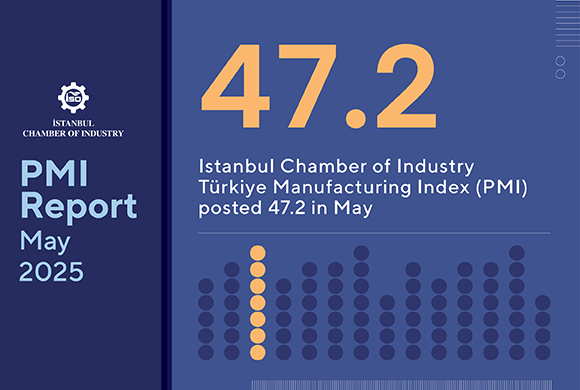News
ICI Released ICI Türkiye Manufacturing PMI and Türkiye Sector PMI Report May 2025
- 02.06.2025
- News

The ICI Türkiye Manufacturing headline PMI posted 47.2 in May, a fraction lower than the readings of 47.3 seen in both March and April. As such, the index pointed to a further solid monthly easing of business conditions in the manufacturing sector. The health of the sector has now moderated in each of the past 14 months.
According to the Istanbul Chamber of Industry Türkiye Sector PMI May 2025 survey, output increased in only two of the 10 sectors monitored under the survey: clothing and leather products and non-metallic mineral products. In the textile sector, however, output continued to slow down significantly. Growth in new export orders was somewhat more widespread. Increases were recorded in four out of ten sectors, led by clothing and leather products. With the general easing of workloads, staffing numbers declined in most of the sectors.
Istanbul Chamber of Industry (ICI) released the May 2025 results of Türkiye Manufacturing PMI (Purchasing Managers’ Index) survey, which is recognized as the fastest and reliable indicator of the manufacturing industry’s performance in the economic growth. According to the results of the survey where any figure greater than 50.0 indicates overall improvement of the sector, the headline PMI posted 47.2 in May, a fraction lower than the readings of 47.3 seen in both March and April. As such, the index pointed to a further solid monthly easing of business conditions in the manufacturing sector. The health of the sector has now moderated in each of the past 14 months.
A softening demand environment was central to the latest moderation of business conditions. New orders eased for the twenty-third month in a row, and at a solid pace. Weak demand and inflationary pressures contributed to a further easing of manufacturing output, with the latest slowdown the most marked since last October.
Employment and purchasing activity were also scaled back to larger extents than in April, while manufacturers reduced their inventories of both inputs and finished goods. Muted demand for inputs meant that suppliers’ lead times shortened for the third consecutive month, albeit to a slightly lesser extent than in the previous survey period. Input costs continued to increase sharply in May, with respondents often linking the latest rise to currency weakness. That said, the pace of inflation eased from the one-year high seen in April. The rate of output price inflation also softened and was the lowest in 2025 so far. While some respondents noted that they had increased charges in response to higher input costs, others reported that muted demand had restricted pricing power.
Commenting on the Istanbul Chamber of Industry Türkiye Manufacturing PMI survey data, Andrew Harker, Economics Director at S&P Global Market Intelligence, said:
"It was a familiar story for the Turkish manufacturing sector in May, with the PMI data showing similarly-paced moderations in a range of key variables as in recent months. Firms will be hoping that growth can be kick-started in the near future. There were at least some signs of inflationary pressures easing over the month which could provide some respite for manufacturers.”
Output increases in two sectors
According to the Istanbul Chamber of Industry Türkiye Sector PMI May 2025 survey, output increased in only two of the 10 sectors monitored under the survey: clothing and leather products and non-metallic mineral products. Clothing and leather products rebounded significantly after the sharp slowdown in the previous month, recording growth and ending the slowdown trend that had been ongoing since August last year. In the textile sector, however, output continued to slow down significantly. The textile sector also saw the sharpest decline in new orders since October 2023. As in output, growth in new orders was limited to the clothing and leather products and non-metallic mineral products sectors.
Growth in new export orders, on the other end, was somewhat more widespread. Increases were recorded in four out of ten sectors, led by clothing and leather products. With the general easing of workloads in May, staffing numbers declined in most of the sectors. The sharpest one was seen in land and sea vehicles sector, which experienced the highest drop in staffing numbers since the survey began in January 2016. On the other hand, three sectors, led by the base metal industry, saw an increase in staffing numbers. Purchasing activity slowed down in all sectors except non-metallic mineral products. Input prices continued to rise overall in May, but cost inflation declined in seven of the 10 sectors. The fastest increase in input prices was in wood and paper products, while the slowest increase was in clothing and leather products. The highest increase in finished products price inflation was again in wood and paper products, while half of the sectors saw a slowdown in the rate of increase compared to the previous month. The textile products was the only sector to reduce sales prices, and saw a decline trend extend into the third month.
You can find attached the Istanbul Chamber of Industry Türkiye Manufacturing PMI and Sector PMI May 2025 reports.